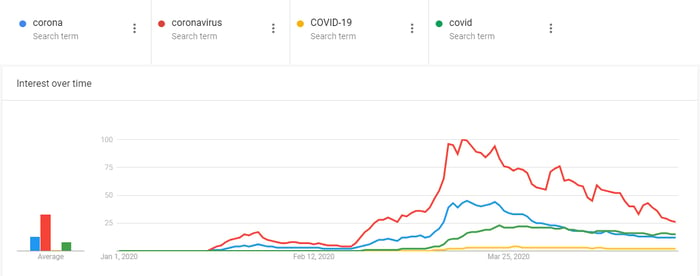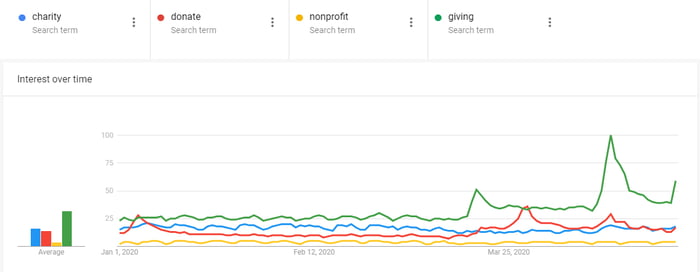What Nonprofits Need to Know in Order to Keep the Lights On
The digital landscape has been heavily impacted by the COVID-19 pandemic, and online advertising is no exception. In the nonprofit sector, we’ve seen responses from organizations range from addressing the coronavirus head on, to shutting down online advertising altogether. The ways in which organizations choose to respond during this extraordinary time is critical to how they will come through it and to how quickly they will recover if they've been negatively impacted. Let’s take a closer look at the current online advertising landscape and what it means for nonprofits.
Current Major Changes to Search
Coronavirus-related phrases in Google Trends demonstrate just how quickly the pandemic has escalated:

Despite being virtually nonexistent in the eyes of Google at the beginning of 2020, search volume surrounding these terms peaked in mid-to-late March, solidifying a major change in national search patterns. But how does this affect nonprofits?

Common nonprofit-related terms such as “charity,” “donate” and “giving” saw a noticeable spike at the same time that the pandemic started to unfold in mid-March. As to be expected during times of crisis, major online channels such as Google, Bing, Facebook and Twitter have adjusted their policies to assist the general public. Google and Bing have both moved COVID-19- and coronavirus-related terms into a content ban list for advertisers, meaning that any copy/keywords/targeting related to these terms are now virtually unusable for advertising. This ban was enacted to combat predatory advertising.
Facebook and Twitter have also adjusted their content policies. Facebook is providing resources for small businesses while Twitter is pushing a ban against sponsored content related to the virus. Social platforms such as Pinterest and TikTok have partnered with the World Health Organization to provide myth-busting content to help stop the spread of misinformation.
With these changes to major online platforms, where does that leave nonprofit marketing?
Nonprofits: 5 Reasons Why You Should Keep Search Ads Running and Not Give Up on Donors
It’s a reality that traffic and donations will likely be affected for most nonprofits. Often, an organization's first reaction to uncertain economic times is to cut costs, and often, advertising dollars are the first to be cut. However, while reducing some advertising costs may be advisable depending on the circumstances of your organization, it is almost never in a nonprofit’s best interest to stop online advertising entirely. Here’s why:
- Your donors are still searching for you – Bidding on your own branded terms won’t cost you much at all. Chances are, if someone clicks on a branded ad, they are qualified, so keeping your branded search campaigns live is important in moving your mission forward in difficult economic times.
- Promote event cancellations or changes so that interested parties can still support you – In this particular crisis, many organizations have had to cancel events or move them online. By turning off your search ads, you may not capture those people who are seeking information about the event and/or are interested in participating. We recommend keeping branded events ads live and driving people to a landing page that has information on the status of the event and how they can still participate and/or support your cause.
- Search engines penalize you for taking your ads out of market – The long-term impact to a PPC Ad Account is substantial when removing advertising for more than 30 days. Quality scores are an important factor in how search engines determine CPCs (cost-per-click). The algorithms used by major search engines to determine quality require a substantial amount of time to analyze your campaigns, site and web presence in order to determine which searches are most qualified to bring converting visitors. Removing yourself from this equation requires you to start that process over from scratch, and depending on the vertical, that recovery period can take up to 6 months. During
thattime, you’ll be paying higher CPCs, which could result in less ROAS (return-on-ad-spend) and a higher CPA (cost-per-acquisition). - It’s prudent to let your donors make their own decisions when it comes to where their dollars go. People give for emotional reasons — because it makes them feel good. It doesn’t make much sense to deprive them of the opportunity to make a gift if they wish to do so. By removing advertising spend, you’re actually reducing the potential for prospective donors to find you.
- Your organic traffic is likely to suffer if you remove your ad spend, and you may see an increased CPA (cost-per-acquisition) – Studies show that organic traffic goes up when an advertiser runs search ads. So, if you stop your search ads, you will likely see a drop in organic traffic and thus a drop in revenue. Studies also show that on average, removing branded search will increase your CPA by roughly 91% and reduce your overall conversions by roughly 50%.
Keeping search ads live during the COVID-19 crisis will absolutely help improve your organic traffic. Beyond keeping ads live, there’s more you can do to succeed during these tumultuous times. In our next blog post of this series, we will explore various ways you can set yourself up for success with paid search.
Interested in learning more about how to improve your nonprofit’s SEO performance? Contact THD today!





